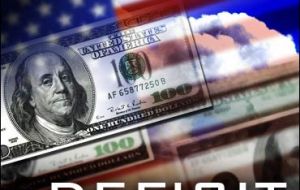MercoPress. South Atlantic News Agency
Bernanke warns about financial stability; opens debate on inflation and rates
 US budget deficit estimated by Congress in 13% of GDP for fiscal 2009.
US budget deficit estimated by Congress in 13% of GDP for fiscal 2009. United States Federal Reserve chairman Ben Bernanke warned Wednesday that the US spending spree now threatens the country's financial stability, amid growing questions over whether governments and central banks around the world have gone too far.
The question now is whether the very measures that are being used to save the global economy from an outright meltdown could trigger hyperinflation and higher interest rates down the road, sowing the seeds for the next crisis.
Central banks have pushed key interest rates to near zero and flooded financial markets with cash, while governments are running up huge debts with spending on infrastructure and bailouts in an attempt to stop the recession from worsening.
Bernanke's comments came one day after an attack on central banks by Chancellor Angela Merkel of Germany, Europe's biggest economy. While Mr. Bernanke's warning Wednesday related to fiscal policy, both officials were warning about pulling back excesses that could pose severe problems later.
Tensions about how to get the ailing global economy off life support burst into the open as Ms. Merkel and Mr. Bernanke clashed over fiscal and monetary policy.
Ms. Merkel attacked the Fed, the Bank of England and the European Central Bank for intervening in financial markets to bolster the economy, warning of inflation and other problems. “What other central banks are doing must be reversed,” she said.
“We must return to independent and sensible monetary policies, otherwise we will be back to where we are now in 10 years' time,” Ms. Merkel said She also said she is “sceptical” of the use of so-called quantitative easing, including direct purchases of government bonds by the Fed and other central banks.
Mr. Bernanke shot back: “I – respectfully – disagree with her views.”
However the Fed chairman told a US congressional committee Wednesday that he acted because the world was facing an extreme financial crisis and a deep recession. “Strong action on the fiscal and monetary side is justified,” he told members of the House of Representatives budget committee.
But Mr. Bernanke did voice concern about another hangover from the recession: the ballooning deficit. He cautioned that the US government is jeopardizing future prosperity if it continues borrowing at the current rate to cover the widening gap between its revenues and expenditures.
“Even as we take steps to address the recession and threats to financial stability, maintaining the confidence of the financial markets requires that we, as a nation, begin planning now for the restoration of fiscal balance” Mr. Bernanke warned.
The US government must show fiscal discipline now or it will face financial instability and shaky growth in the years ahead, he said.
The US will run up a record 1.85-trillion US dollars deficit this year, equivalent to 13% of GDP, according to the Congressional Budget Office. The deficit is on course to be more than four times larger than last year's all-time high.
Concern among investors about the deficit is a key cause of rising rates on long term bonds, Mr. Bernanke said.
“In recent weeks, yields on longer-term Treasury securities and fixed-rate mortgages have risen,” he said. “These increases appear to reflect concerns about large federal deficits but also other causes, including greater optimism about the economic outlook, a reversal of flight-to-quality flows and technical factors related to the hedging of mortgage holdings.”
Rising interest rates undermine everything the Fed is trying to do to revive business and consumer spending. And Mr. Bernanke's comments mark a clear warning to Congress that it's time to start thinking about the post-recession and fiscal restraint.
Representative Paul Ryan of Wisconsin, the ranking Republican on the committee, warned that the government's borrowing needs, combined with the Fed's pledge to buy government bonds, is a “dangerous policy mix” that could soon spark “runaway inflation.”
Mr. Ryan also worries the Fed will keep priming the pump too long in the face of a deep recession, undermining its ability to keep prices in check. “We policy makers should realize that our most challenging policy period is going to be ahead of us,” he told Mr. Bernanke.
But many experts disagree, arguing that high interest rates pose a greater danger than inflation. Menzie Chinn, a professor of public affairs and economics at the University of Wisconsin, said Japan's experience in the 1990 suggests that surging debt levels do not spark hyperinflation when an economy is mired in recession.
“The US is a big net debtor to the rest of the world, with extremely large holdings of US Treasuries by foreign private and state actors,” Prof. Chinn said. “I worry more about higher real interest rates than higher inflation”.




Top Comments
Disclaimer & comment rules-

Read all commentsThe information given in the site is very helping.The whole site cover a wide range of topics.
Jun 17th, 2009 - 10:11 pm 0Suzzane Waltz
<a href=“http://www.fastrealestate.net” rel=“dofollow”>realestate</a>
Commenting for this story is now closed.
If you have a Facebook account, become a fan and comment on our Facebook Page!